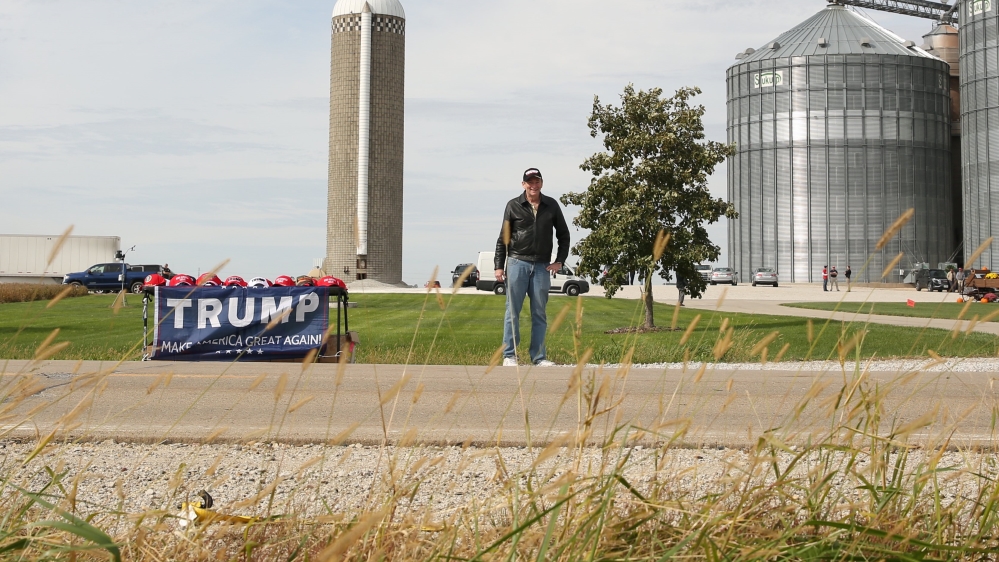No love for Trump: Trade war stings some Iowa farmers
While polling data shows support for Trump among US farmers is high, one group of Iowa farmers bucks trend.

Osage, Iowa – For years, Iowa residents across rural areas have seen their downtowns shrink, as farms consolidate and businesses, schools and maternity wards regularly close. In Osage, a town of about 3,500 people near Minnesota’s southern border with Iowa, Main Street is noticeably active.
“Talking with other main street businesses, it wasn’t nearly as good as it was five years ago, but main street is still strong,” said Josh Olson, coowner of Limestone Brewers, which opened in 2018.
Keep reading
list of 4 items‘Insurrection’ should bar Donald Trump from US presidency, lawyers argue
Ex-Proud Boys leader Joseph Biggs sentenced to 17 years for US Capitol riot
Trump indictments: Key court dates set in Georgia, federal election cases
Olson said they were lucky to buy keg equipment right before prices on stainless steel jumped due to new tariffs. He sees Limestone Brewers as a place for people to gather on a cold evening.

“We see a lot of conversation. And they may be talking about finance, about the state of the farm, or they may just come in to talk about something else. It almost acts as a relief for some of these families,” Olson said. “Okay, I’ve been discussing how we’re gonna survive the next year with every other guy, let’s go have a beer and talk about the Super Bowl.”
Osage, a farming community heavily reliant upon the soybean and corn markets, has been caught in the crosshairs of a trade war between the United States and China that began in 2018, following years of already falling prices.
“This is probably the most difficult time in my farming life on making decisions to market corn and soybeans,” said Jon Gisleson, who has farmed corn and soybean for 45 years, including during the 1980s farm crisis.
Softening the tariff sting
To lessen the effect of those tariffs, Trump introduced funds to assist affected producers, including growers of soybean and corn, in 2018 and 2019. Last year, he authorised the USDA to provide up to $14.5bn.
Alec Amundson, who has been farming for four years, said those payments have helped, but they are not enough.
“That money in a lot of cases was a person’s only income for the year. Even then, some people operated at a loss, and that loss was just made smaller. If it weren’t for those payments, there would have been a lot more farm auctions, a lot more people getting forced out of farming,” Amundson said.
He said he and friends often joke about the “Trumpcare” they are getting, but that he – like everyone else interviewed – would rather earn money through trade, and not aid.
The ripple effects have been felt throughout Osage and surrounding areas. Amundson said churches are seeing fewer donations, and farm equipment dealers are seeing fewer profits. Nationally, farm bankruptcies have gone up.
“Even in our business of selling equipment, we haven’t sold as much of the big stuff as we used to. It’s all been smaller sales. People aren’t looking to spend money unless they can really justify that expense or they made a small profit and have decided to upgrade technology,” said Amundson, who also works at an agricultural technology provider company.
In the 2008 and 2012 general elections, Mitchell County, where Osage is located, voted for Democrat Barack Obama. In 2016, it pivoted to Donald Trump, a Republican. Heading into the 2020 campaign season, it is unclear how well Trump will do this time.

“A lot of farmers I talk to voted for Trump because he was going to be tough on trade, and they want to see that through,” said Amundson, noting that the recent announcement of a phase one deal has buoyed support for the president. “There were also a lot of people within the last couple years who’ve said: ‘You know what, maybe we should have stayed out of this trade battle.'”
Trump addressed farmers across the nation at the annual American Farm Bureau Federation conference earlier this month, to lots of applause.
Gisleson, who was at the meeting, said he was “flabbergasted” by how many people still support Trump, despite their finances taking a direct hit due to the trade war. He does not understand why he should “thank” Trump for attempting to replace the income that he “took away” from farmers through Market Facilitation Program (MFP) payments. Gisleson said he also often tells fellow recipients to consider what that money was otherwise earmarked for.
“Tariffs have crippled us and will cripple us for years,” said Gisleson.
Boyd Campbell, who said he did not vote for Trump in 2016, is a lifelong Republican and farmer for almost 50 years. He is on the board of directors at First Security Bank in the nearby town of Charles City. After reviewing so many balance statements that rely heavily on the MFP payments, Campbell has also been surprised that there is such high support for Trump among farmers.
“I think they’ve been hoodwinked a little bit. They’ve lost a little perspective of the fact that the trade wars have hurt us. We’re going on almost two years now. We’ve lost an awful lot of soybean business to Brazil,” Campbell said.
Tariffs have crippled us and will cripple us for years
He said farmers, who are famously patient and optimistic, are not yet blaming Trump. Many also offer up that something needed to be done about China.
“Since when are we supposed to be leading the charge?” Campbell said. “I don’t understand, if we get this intellectual property nailed down, I don’t see IBM or Intel or Sysco coming back to the farmers and saying, ‘Gee, we’re so glad that you did this for us.’ You know? I think there’s other ways we could have handled this.”
Looking towards the next election, Campbell has already begun actively urging Democrats to pick a moderate candidate, someone who independents and moderate Republicans can get behind. He has attended town hall meetings and even registered as a Democrat, in order to caucus across the aisle on Monday.
If Senators Bernie Sanders or Elizabeth Warren – both more progressive candidates – wins the Democratic nomination, Campbell said he will just write in someone else.
“This is kinda like pulling me through a knothole backwards,” Campbell said.
For now, Campbell said, there is “no revolt”, due in part to farmers’ general optimistic and patient natures, a statement backed up by Purdue University’s most recent monthly Ag Economy Barometer report that reviews farmers’ outlook.
“A lot of them will be on the verge of bankruptcy before they complain,” Campbell said.
Gisleson said the tipping point might only come when they are unable to access the necessary line of credit to fully fund their operations, an idea supported by a 2019 Iowa State University report that shows 44 percent of Iowa farmers experienced “financial hardship”.
“I think that might be a turning point. I don’t know,” Gisleson said.
